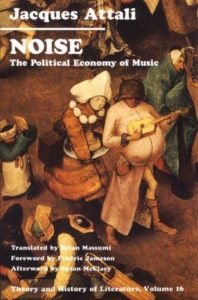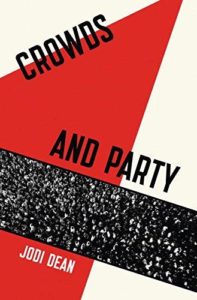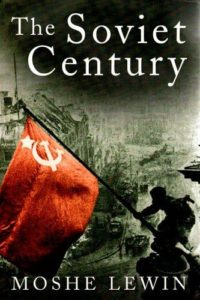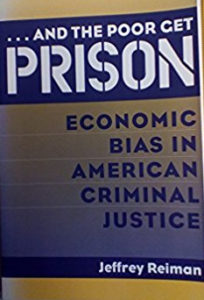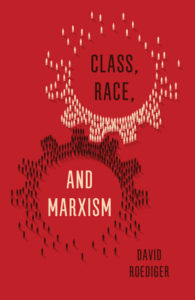
Jodi Dean – Crowds and Party (Verso 2016)
Jodi Dean’s book Crowds and Party deals with the more or less long-standing battle within the political left between communist and anarchist tendencies (including autonomism, etc.), and she offers her thoughts on recent trends in the anarchist direction embodied in Occupy Wall Street and similar protest movements. As “Lefty” Hooligan put it (in “Anarchist Purges Anarchist; No News at 11,” MaximumRocknRoll, issue #375, Aug. 2014):
“Post-left anarchism categorically rejects the Left, from the social democracy and Marxism-Leninism of the Old Left to the Maoism and Third Worldism of the New Communist Movement that devolved from the New Left, as well as any anarchism that is in the least bit influenced by the Left. This is not merely a refusal of the Left’s ideological content, but of its organizational forms as well, from meetings run by Robert’s Rules of Order to various kinds of party-building. But nothing unites post-left anarchism beyond this negation, leaving a disparate gaggle of personalities . . . .”
Responding to this situation, and approvingly citing Ellen Meiksins Wood‘s critique of “left realism”, Dean posits that anarchist tendencies are ineffectual and recommends a return to Marxist-Leninism — updated to reflect current contexts of course, and with recognition of past errors. This means going beyond crowds to actual political parties that can hold power. Staughton Lynd has written in somewhat similar terms, quoting Victor Serge saying that anarchism is about “idealistic aspiration” but anarchist thinking is impractical and anarchists lack any answer to the question of power. Part of Dean’s argument focuses on how “Marxists” have over time, but especially in the neoliberal era and since the overthrow of the USSR, explicitly or tacitly substituted anarchist tenets for Marxist-Leninist ones. She writes:
“Some on the Left—autonomists, insurrectionists, anarchists, and libertarian communists—so embrace the energy unleashed by the crowd that they mistake an opening, an opportunity, for an end. They imagine the goal of politics as the proliferation of multiplicities, potentialities, differences. The unleashing of the playful, carnivalesque, and spontaneous is taken to indicate political success, as if duration were but a multiplication of moments rather than itself a qualitative change. For the fantasists of politics as beautiful moment, any interpretation of a crowd event is to-be-contested because of its unavoidable incompleteness, its partiality. They forget, or disavow, the fact that the non-all character of the people is the irreducible condition of struggle. And so they treat organization, administration, and legislation as a failure of revolution, a return of impermissible domination and hierarchy rather than as effects and arrangements of power, rather than as attributes of the success of a political intervention.” (p. 125).
In this sense she echoes something Frantz Fanon wrote decades earlier in Les Damnés de la Terre [The Wretched of the Earth]:
“the success of the struggle presupposes clear objectives, a definite methodology and above all the need for the mass of the people to realize that their unorganized efforts can only be a temporary dynamic. You can hold out for three days—maybe even for three months—on the strength of the admixture of sheer resentment contained in the mass of the people; but you won’t win a national war, you’ll never overthrow the terrible enemy machine, and you won’t change human beings if you forget to raise the consciousness of the rank-and-file. Neither stubborn courage nor fine slogans are enough.”
Dean refers to “crowds” in reference to uprisings and outbursts like Occupy Wall Street. She looks to crowd theorists like Gustave Le Bon (The Crowd: A Study of the Popular Mind), Sigmund Freud (Group Psychology and the Analysis of the Ego), and Elias Canetti (Crowds and Power), but explores the limits of crowds in addition to their potentials and other positive attributes. She notes how Canetti identifies crowds with what psychoanalysis calls “desire”, that is, providing direction and growth toward a fundamentally unattainable goal (i.e., a desire to desire). Her engagement with past “crowd theorists” makes up some of the best parts of her book.
Following the likes of Slavoj Žižek and Bruno Bosteels, Dean sees the contemporary problem of the Left as being how to transform the state itself, not to abandon or merely seize it. She insists, “What matters for us here and now is the galvanization of such a communist will.” (p. 150). She offers an extended critique of John Holloway‘s Change the World Without Taking Power to make this point. Curiously, she never engages Žižek’s The Fragile Absolute, which deals with the origins of communist universalist thinking in christianity and explores the problem of institutionalizing those concepts in the foundations of the christian church. It would have been interesting to read Dean’s take on that book, which explores a topic directly related to the central topics of Crowds and Party.
Dean emphasizes the idea of the political party as a “gap”. “The party operates as the support for the subject of communism by holding open the gap between the people and their setting in capitalism.” (p. 206). She continues:
“One might object that contemporary decentered, federated, and interlinked states are not in anyone’s hands and therefore cannot be seized. This objection, however, implicitly endorses a liberal technocratic view of the state. It proceeds as if the system of laws and assumptions on which states are based are nothing more than neutral protocols. The classic communist ideal of the dictatorship of the proletariat confronts this lie directly. The liberal state is in actuality the dictatorship of capital. Its premises ensure that the benefit of the doubt, ‘common sense,’ falls on the side of capitalism, that what feels like the right decision is the one that confirms the bourgeois mindset: protect private property, preserve individual liberties, promote trade and commerce. The goal of taking control of the state takes aim at this underlying level of laws, practices, and expectations, targeting common sense to make it the sense for and of the common.
“Capitalists will not voluntarily reorganize processes of accumulation so as to put an end to proletarianization. They will not simply hand over control and ownership of the means of production. States will not just stop oppressing, arresting, and imprisoning those who resist them. Such fundamental changes will only come about through political struggle, carried out internationally. A Left that eschews organizing for power will remain powerless. This is why we are talking about the party again.” (p. 207).
To take one rather arbitrary example from after Crowds and Party was published, Andreas Malm wrote an essay entitled “Time to Pull the Plugs” about the problem of and solutions to impending ecological catastrophe. While presenting a useful present history of the state of ecological collapse, Malm asserts that Naomi Klein is a “radical thinker” who calls for “revolt” (Dean has elsewhere critiqued precisely this characterization of Klein; Dean believes Klein is precisely not radical — she accepts capitalism so long as it is not “neoliberal” capitalism), and offers cursory, conclusory dismissals of calls to end capitalism as untenable, unrealistic, reckless, etc. It is precisely the likes of Malm that Dean rails against, because, just like “third way” liberals, they concede too much to achieve anything. In short, people like Malm abandon the “communist will”, but in doing so refuse to acknowledge the defeatist implications of doing so.
There are a few unconvincing parts of the book. When Dean attempts to offer new (re)interpretations of certain concepts, she mostly fails to establish these, or at least, the necessity of her reinterpretations. Among those is her concept (actually developed prior to this book) of “communicative capitalism”. She notes that others already have different terms for very similar concepts. Her term is not as intuitive as some others. She seems to be “branding” her own theory (even though she criticizes “personal branding” in general). Frankly, she explains “communicative capitalism” better elsewhere. Another weak spot is where she tries to offer an explanation for the rise of individualism by the 1970s. She relies on Michel Foucault to argue that the “individual” is a limiting state created as part of social discipline. In this, she cites Foucault to view “discipline” in a purely negative sense, as something always bad. But some counter-examples show how “discipline” can actually forge collectives. One such example is the Boxer Rebellion in China (admittedly, a topic for which there is relatively little in-depth treatment in English). Another is the musician Sun Ra‘s Arkestra. Sun Ra took in former drug addicts and gang members into his musical group, and emphasized “discipline” as a way to forge a collective musical project. Paulo Freire has emphasized, too, how discipline can enhance intuitive learning while still promoting the sort of freedom that concerns Dean. Self-discipline is something that requires no “capital” and therefore, in at least these (counter-)examples, the poor can use it to strengthen themselves, but also to build solidarity “from below”. Dean’s arguments for why individualism arose in recent history is unconvincing, but it is largely a distraction from her main arguments — she does establish that individualism became a dominant perspective in America, and why that was the case is at best secondary to her main theses. For that matter, later in her book she approvingly cites communist party discipline as a way to develop learning and growth, in a way that echoes Freire. So, her invocation of “discipline” seems to leave some loose threads. And to the extent that the summary above unfairly characterizes here arguments about “discipline” it may well be because her argument is hard to follow.
Also, the last chapter reads like the “Lifetime Movie” of the book, as Dean seeks to unearth historical examples to illustrate how a communist party can act on an emotional level. It is a strange chapter that seems directed to an entirely different audience than the preceding chapters. While the last chapter certainly expands on the theoretical approach of the rest of the book, it also threatens to drift into historical irrelevancy, because Dean doesn’t try to connect the historical examples to any kind of contemporary relevance. Instead, the examples are meant to historically bolster her theoretical principles, while, in a way, some undermine her theory that the party is of contemporary importance by lacking clear contemporary relevance (for instance, how many workers today live in “company towns” and are sons of sharecroppers?).
Reviewing Alfie Bown’s book Enjoying It – Candy Crush and Capitalism, Joe Kennedy wrote:
“‘Our ideas surrounding the enjoyment of critical theory and political resistance lead to the celebrated identity of the radical, which is another way of being a subject that suits capitalism’. In other words, the inclusive, absorptive nature of capitalism, which needs to bring everything within the scope of its mechanics of commodification, means that the radical is yet one more demographic to be sold to, another identity which can only find its expression through consumer preference. If this seems far-fetched, follow the twitter account of left-leaning London publishers Verso, who frequently retweet photographs sent in by satisfied customers of the piles of Marx (and assorted modern Marxist thinkers) which have just landed on their doormats.”
He refers to the very same London publisher of Dean’s Crowds and Party. There is a risk in getting caught up in the “identity of the radical”, but Dean has, I think, gotten past those concerns, illustrating positive uses for such a collective identity.
Still, Dean’s vision of a communist party certainly runs against other conceptions of communism generally. After all, Friedrich Engels‘ personal motto was “take it easy.” Dean’s reliance on Žižek runs up against this too. Dean seems to endorse something close to a Stalinist total mobilization, though this hardly seems like the sort of ideal likely to attract many adherents. Of course, there remains a difference between a communist society and a communist party, but this distinction is a potential sticking point for how persuasive Dean’s approach will (or will not) be to potential party members.
Anyway, Dean’s book presents a number of opportunities for further research. For example, in a number of places the way she describes party activity bears a striking resemblance to pro-capitalist “business guru” advisers’ writings. She describes the contents of the Communist Party of the United States’ Party Organizer publication in the 1930s, and highlights how it “expresses the pressure of the relentless injunction to do more[.]” (p. 194). This compares closely to the concept of a “big hairy audacious goal” of business consultants Jim Collins and Jerry Porras (in their discredited book Built to Last: Successful Habits of Visionary Companies). Elsewhere, Dean states, “Without the party, there is no body capable of remembering, learning, and responding.” (p. 260). This sounds very close to the dubious business organizations concept of Peter Senge‘s The Fifth Discipline, which posits that organizations (rather than the people in them) can learn and retain knowledge. Of course, certain noted communists have at various times suggested that capitalist management practices should be adopted and adapted to communist ends where appropriate, so perhaps these parallels aren’t totally odd. But they present opportunities for elaboration, at least in a comparative sense.
Crowds and Party, measured by how many good ideas it presents is a great success. Measured by readability or consistency, it stumbles, due to the extensive academic jargon and sometimes cluttered prose, and because whole sections of the book are throwaways. All together, it is a worthy and important piece of analysis that probably could have benefited from a bit further revision and refinement. In short, people like Lenin successfully refuted the anarchists a century ago, and once all the historical revisionism is stripped away, the anarchists are still wrong for all the same reasons. So, if readers step away with anything concrete, it hopefully is a desire to read (or re-read) Lenin‘s The State and Revolution with the understanding that it still presents the most relevant formulation of left politics a hundred years later, and, for good measure, Žižek’s recent Trouble in Paradise: From the End of History to the End of Capitalism (arguably his most readable and relevant recent book) — even Domenico Losurdo‘s War and Revolution: Rethinking the Twentieth Century. It is also relevant to note that Dean is active in the Party for Socialism and Liberation (PSL), so anyone located in the United States who is enthusiastic about what she has written here should perhaps investigate that political party. Dean certainly has a better bead on effective left politics than other commentators.

